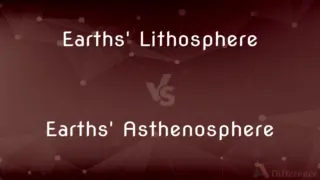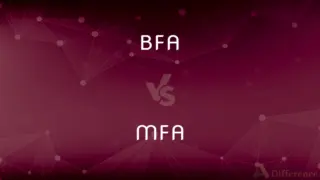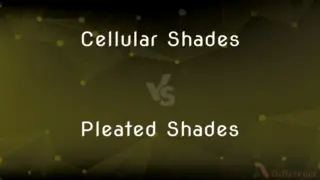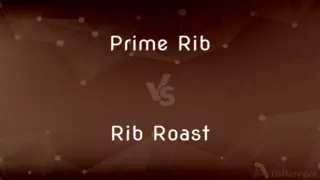Fume vs. Smoke — What's the Difference?
Edited by Tayyaba Rehman — By Fiza Rafique — Updated on November 6, 2023
Fumes are fine particles arising from volatile substances, often with a strong odor; smoke is a mix of gases and suspended particles from combustion.

Difference Between Fume and Smoke
Table of Contents
ADVERTISEMENT
Key Differences
Fumes are often associated with the vaporization of metals, chemicals, or acidic compounds and are usually the result of a chemical reaction or high temperature process. Smoke, on the other hand, primarily originates from organic materials like wood or fossil fuels and is produced through the process of combustion. Both fumes and smoke can be hazardous to health, but fumes are specifically linked to smaller, often more toxic particles.
While fumes are indicative of a finer aerosol, typically invisible to the naked eye, smoke is usually a visible collection of carbon-based particulates and vapors. Both can carry harmful substances, but fume particles are generally smaller and can penetrate deeper into the lungs. Smoke is more associated with the noticeable presence of soot and ash.
In terms of industrial and environmental impact, fumes are often generated in manufacturing processes, welding, and laboratories. Smoke is the product of wildfires, burning coal, or wood, and is common in household fireplaces. Each requires different methods for control and filtration to mitigate their respective health risks.
Addressing the hazards of fumes typically involves chemical containment and specialized ventilation systems due to their potential toxicity and chemical nature. Controlling smoke is often a matter of efficient combustion and particulate filtration, reflecting its more physical nature. Both fumes and smoke can contribute to air pollution, but they stem from different sources.
Lastly, fumes and smoke are both airborne substances but differ in their composition and origin. Fumes can result from a wider range of activities, including battery operation, painting, or the application of certain pesticides, while smoke is narrowly related to combustion. While fumes might result from a reaction at room temperature, smoke is always connected to heat.
ADVERTISEMENT
Comparison Chart
Definition
Fine particles from volatile substances.
Particulate byproduct of combustion.
Visibility
Often invisible.
Generally visible.
Source Materials
Metals, chemicals, acidic compounds.
Organic materials, wood, fossil fuels.
Health Risk Characteristics
Smaller particles, deeper lung penetration.
Contains soot, ash, and various gases.
Control Methods
Chemical containment, ventilation.
Efficient combustion, particulate filters.
Compare with Definitions
Fume
Fumes are fine particles resulting from volatile substances often seen in industrial settings.
The workers wore masks to protect themselves from the metallic fumes.
Smoke
Smoke is the visible vapor and gases emitted when a substance burns.
Smoke billowed from the chimney of the old house.
Fume
In literature, "fume" can represent something that is unsubstantial or fleeting.
Her dreams vanished like a fume into the night air.
Smoke
In a figurative sense, smoke can mean to perform exceedingly well or with a lot of energy.
She smoked the competition in the bike race.
Fume
Fume is also used to describe the act of emitting gas or vapor.
The hot engine began to fume as it overheated.
Smoke
Smoke is a collection of airborne particulates and gases emitted when a material undergoes combustion or pyrolysis, together with the quantity of air that is entrained or otherwise mixed into the mass. It is commonly an unwanted by-product of fires (including stoves, candles, internal combustion engines, oil lamps, and fireplaces), but may also be used for pest control (fumigation), communication (smoke signals), defensive and offensive capabilities in the military (smoke screen), cooking, or smoking (tobacco, cannabis, etc.).
Fume
An amount of gas or vapour that smells strongly or is dangerous to inhale
Clouds of exhaust fumes spewed by cars
Smoke
A visible suspension of carbon or other particles in air, typically one emitted from a burning substance
Bonfire smoke
Fume
Feel, show, or express great anger
‘We simply cannot have this’, she fumed
The minister reportedly fumed at officials of the department
Smoke
An act of smoking tobacco
I'm dying for a smoke
Fume
Emit gas or vapour
Fragments of lava hit the ground, fuming and sizzling
Smoke
A big city, especially London
She was offered a job in the Smoke
Fume
Vapor, gas, or smoke, especially if irritating, harmful, or strong.
Smoke
Emit smoke or visible vapour
Heat the oil until it just smokes
Fume
A strong or acrid odor.
Smoke
Inhale and exhale the smoke of tobacco or a drug
Janine was sitting at the kitchen table smoking
He smoked forty cigarettes a day
Fume
A state of resentment or vexation.
Smoke
Treat, fumigate, or cleanse by exposure to smoke.
Fume
To subject to or treat with fumes.
Smoke
Kill (someone) by shooting
They gotta go smoke this person
Fume
To give off in or as if in fumes.
Smoke
Make fun of (someone)
We baited her and smoked her
Fume
To emit fumes.
Smoke
A mixture of gases and small suspended particles of soot or other solids, resulting from the burning of materials such as wood or coal.
Fume
To rise in fumes.
Smoke
A cloud of such gases and suspended particles.
Fume
To feel or show resentment or vexation.
Smoke
A vapor, mist, or fume that resembles this.
Fume
A gas or vapour/vapor that is strong-smelling or dangerous to inhale.
Don't stand around in there breathing the fumes while the adhesive cures.
Smoke
Something insubstantial, unreal, or transitory
"What everybody echoes or in silence passes by as true to-day may turn out to be falsehood to-morrow, mere smoke of opinion" (Henry David Thoreau).
Fume
A material that has been vaporized from the solid or liquid state to the gas state and re-coalesced to the solid state.
Lead fume is a greyish powder, mainly comprising lead sulfate.
Smoke
The act of smoking a form of tobacco
Went out for a smoke.
Fume
Rage or excitement which deprives the mind of self-control.
Smoke
The duration of this act.
Fume
Anything unsubstantial or airy; idle conceit; vain imagination.
Smoke
(Informal) Tobacco in a form that can be smoked, especially a cigarette
Money to buy smokes.
Fume
The incense of praise; inordinate flattery.
Smoke
A substance used in warfare to produce a smokescreen.
Fume
(obsolete) A passionate person.
Smoke
Something used to conceal or obscure.
Fume
(transitive) To expose (something) to fumes; specifically, to expose wood, etc., to ammonia in order to produce dark tints.
Smoke
A pale to grayish blue to bluish or dark gray.
Fume
(transitive) To apply or offer incense to.
Smoke
(Baseball) Pitches thrown at high velocity; fast balls
Threw a lot of smoke in the early innings.
Fume
(intransitive) To emit fumes.
Smoke
To draw in and exhale smoke from a cigarette, cigar, or pipe
It's forbidden to smoke here.
Fume
(intransitive) To pass off in fumes or vapours.
Smoke
To engage in smoking regularly or habitually
He smoked for years before stopping.
Fume
To express or feel great anger.
He’s still fuming about the argument they had yesterday.
Smoke
To emit smoke or a smokelike substance
Chimneys smoking in the cold air.
Fume
To be as in a mist; to be dulled and stupefied.
Smoke
To emit smoke excessively
The station wagon smoked even after the tune-up.
Fume
Exhalation; volatile matter (esp. noxious vapor or smoke) ascending in a dense body; smoke; vapor; reek; as, the fumes of tobacco.
The fumes of new shorn hay.
The fumes of undigested wine.
Smoke
To go or proceed at high speed.
Fume
Rage or excitement which deprives the mind of self-control; as, the fumes of passion.
Smoke
To play or perform energetically
The band was really smoking in the second set.
Fume
Anything vaporlike, unsubstantial, or airy; idle conceit; vain imagination.
A show of fumes and fancies.
Smoke
To draw in and exhale the smoke of (tobacco, for example)
I've never smoked a panatela.
Fume
The incense of praise; inordinate flattery.
To smother him with fumes and eulogies.
Smoke
To do so regularly or habitually
I used to smoke filtered cigarettes.
Fume
Solid material deposited by condensation of fumes; as, lead fume (a grayish powder chiefly lead sulphate).
Smoke
To preserve (meat or fish) by exposure to the aromatic smoke of burning hardwood, usually after pickling in salt or brine.
Fume
To smoke; to throw off fumes, as in combustion or chemical action; to rise up, as vapor.
Where the golden altar fumed.
Silenus lay,Whose constant cups lay fuming to his brain.
Smoke
To fumigate (a house, for example).
Fume
To be as in a mist; to be dulled and stupefied.
Keep his brain fuming.
Smoke
To expose (animals, especially insects) to smoke in order to immobilize or drive away.
Fume
To pass off in fumes or vapors.
Their parts are kept from fuming away by their fixity.
Smoke
To expose (glass) to smoke in order to darken or change its color.
Fume
To be in a rage; to be hot with anger.
He frets, he fumes, he stares, he stamps the ground.
While her mother did fret, and her father did fume.
Smoke
To kill; murder.
Fume
To expose to the action of fumes; to treat with vapors, smoke, etc.; as, to bleach straw by fuming it with sulphur; to fill with fumes, vapors, odors, etc., as a room.
She fumed the temple with an odorous flame.
Smoke
To defeat decisively, as in a competition.
Fume
To praise inordinately; to flatter.
They demi-deify and fume him so.
Smoke
(Baseball) To throw (a pitch) at high velocity.
Fume
To throw off in vapor, or as in the form of vapor.
The heat will fume away most of the scent.
How vicious hearts fume frenzy to the brain!
Smoke
(uncountable) The visible vapor/vapour, gases, and fine particles given off by burning or smoldering material.
Fume
A cloud of fine particles suspended in a gas
Smoke
A cigarette.
Can I bum a smoke off you?;
I need to go buy some smokes.
Fume
Be mad, angry, or furious
Smoke
Anything to smoke (e.g. cigarettes, marijuana, etc.)
Hey, you got some smoke?
Fume
Emit a cloud of fine particles;
The chimney was fuming
Smoke
An instance of smoking a cigarette, cigar, etc.; the duration of this act.
I'm going out for a smoke.
Fume
Treat with fumes, expose to fumes, especially with the aim of disinfecting or eradicating pests
Smoke
A fleeting illusion; something insubstantial, evanescent, unreal, transitory, or without result.
The excitement behind the new candidate proved to be smoke.
Fume
Be wet with sweat or blood, as of one's face
Smoke
Something used to obscure or conceal; an obscuring condition; see also smoke and mirrors.
The smoke of controversy.
Fume
Fume refers to gas or vapor that emits strong odors or chemicals.
The laboratory was evacuated due to toxic fumes from the spilled acid.
Smoke
(uncountable) A light grey colour/color tinted with blue.
Fume
Fume can indicate a state of smoldering anger or irritation.
He was fuming after being passed over for the promotion.
Smoke
Bother; problems; hassle.
You better not be giving me no smoke.
Smoke
A particulate of solid or liquid particles dispersed into the air on the battlefield to degrade enemy ground or for aerial observation. Smoke has many uses--screening smoke, signaling smoke, smoke curtain, smoke haze, and smoke deception. Thus it is an artificial aerosol.
Smoke
A fastball.
Smoke
(countable) A distinct column of smoke, such as indicating a burning area or fire.
Smoke
(transitive) To inhale and exhale the smoke from a burning cigarette, cigar, pipe, etc.
Smoke
(intransitive) To inhale and exhale tobacco smoke.
Do you smoke?
Smoke
(intransitive) To give off smoke.
My old truck was still smoking even after the repairs.
Smoke
(intransitive) Of a fire in a fireplace: to emit smoke outward instead of up the chimney, owing to imperfect draught.
Smoke
(transitive) To preserve or prepare (food) for consumption by treating with smoke.
You'll need to smoke the meat for several hours.
Smoke
(transitive) To dry or medicate by smoke.
Smoke
To fill or scent with smoke; hence, to fill with incense; to perfume.
Smoke
To make unclear or blurry.
Smoke
To perform (e.g. music) energetically or skillfully.
The horn section was really smokin' on that last tune.
Smoke
To beat someone at something.
We smoked them at rugby.
Smoke
To kill, especially with a gun.
He got smoked by the mob.
Smoke
To thrash; to beat.
Smoke
To smell out; to hunt out; to find out; to detect.
Smoke
To ridicule to the face; to mock.
Smoke
To burn; to be kindled; to rage.
Smoke
To raise a dust or smoke by rapid motion.
Smoke
To suffer severely; to be punished.
Smoke
To punish (a person) for a minor offense by excessive physical exercise.
Smoke
(transitive) To cover (a key blank) with soot or carbon to aid in seeing the marks made by impressioning.
Smoke
The visible exhalation, vapor, or substance that escapes, or expelled, from a burning body, especially from burning vegetable matter, as wood, coal, peat, or the like.
Smoke
That which resembles smoke; a vapor; a mist.
Smoke
Anything unsubstantial, as idle talk.
Smoke
The act of smoking, esp. of smoking tobacco; as, to have a smoke.
Smoke
To emit smoke; to throw off volatile matter in the form of vapor or exhalation; to reek.
Hard by a cottage chimney smokes.
Smoke
Hence, to burn; to be kindled; to rage.
The anger of the Lord and his jealousy shall smoke agains. that man.
Smoke
To raise a dust or smoke by rapid motion.
Proud of his steeds, he smokes along the field.
Smoke
To draw into the mouth the smoke of tobacco burning in a pipe or in the form of a cigar, cigarette, etc.; to habitually use tobacco in this manner.
Smoke
To suffer severely; to be punished.
Some of you shall smoke for it in Rome.
Smoke
To apply smoke to; to hang in smoke; to disinfect, to cure, etc., by smoke; as, to smoke or fumigate infected clothing; to smoke beef or hams for preservation.
Smoke
To fill or scent with smoke; hence, to fill with incense; to perfume.
Smoke
To smell out; to hunt out; to find out; to detect.
I aloneSmoked his true person, talked with him.
He was first smoked by the old Lord Lafeu.
Upon that . . . I began to smoke that they were a parcel of mummers.
Smoke
To ridicule to the face; to quiz.
Smoke
To inhale and puff out the smoke of, as tobacco; to burn or use in smoking; as, to smoke a pipe or a cigar.
Smoke
To subject to the operation of smoke, for the purpose of annoying or driving out; - often with out; as, to smoke a woodchuck out of his burrow.
Smoke
A cloud of fine particles suspended in a gas
Smoke
A hot vapor containing fine particles of carbon being produced by combustion;
The fire produced a tower of black smoke that could be seen for miles
Smoke
An indication of some hidden activity;
With all that smoke there must be a fire somewhere
Smoke
Something with no concrete substance;
His dreams all turned to smoke
It was just smoke and mirrors
Smoke
Tobacco leaves that have been made into a cylinder
Smoke
Street names for marijuana
Smoke
The act of smoking tobacco or other substances;
He went outside for a smoke
Smoking stinks
Smoke
(baseball) a pitch thrown with maximum velocity;
He swung late on the fastball
He showed batters nothing but smoke
Smoke
Inhale and exhale smoke from cigarettes, cigars, pipes;
We never smoked marijuana
Do you smoke?
Smoke
Emit a cloud of fine particles;
The chimney was fuming
Smoke
Smoke can also refer to the act of inhaling and exhaling the smoke from tobacco.
He stepped outside to smoke a cigarette.
Smoke
Smoke can imply a ruse or something designed to obscure and confuse.
The leaked information was just smoke to divert attention from the real issue.
Smoke
In colloquial use, "smoke" can refer to killing or defeating someone or something.
The team got smoked in the final quarter of the game.
Common Curiosities
Can fumes catch fire?
Yes, fumes can be flammable if they come from combustible materials and mix with air in the right proportions.
Are all fumes a result of combustion?
No, fumes can also result from chemical reactions that don't involve combustion.
Is smoke always harmful to breathe?
Smoke often contains harmful substances and can be dangerous to breathe, but the harm can vary with the smoke's source and concentration.
Can fumes cause long-term health problems?
Prolonged or intense exposure to toxic fumes can lead to long-term health issues, including respiratory problems.
Can both fume and smoke be produced at the same time?
Yes, processes like burning plastics can produce both smoke and toxic fumes simultaneously.
Are fumes always toxic?
Many fumes can be toxic, especially from chemicals or metals, but toxicity varies depending on the substance.
What are some common sources of fumes?
Common sources include industrial processes, vehicle exhausts, welding, and some printing and painting operations.
Do fumes rise like smoke?
Fumes can rise or spread out at ground level depending on their density relative to the surrounding air.
How can I protect myself from smoke and fumes?
Use proper ventilation, wear protective masks, and ensure good air filtration in your environment.
Is smoke always visible?
Smoke is typically visible, though how clearly it can be seen can vary depending on the intensity of the fire and materials being burned.
Can fumes be odorless?
Yes, some fumes can be odorless, making them particularly hazardous as they can go undetected.
Do smoke detectors detect fumes?
Some smoke detectors can detect fumes, especially if there are particles involved, but not all fumes will be detected by standard smoke detectors.
What's the main difference in handling fume and smoke in a fire situation?
Smoke management typically involves evacuation and containment, while fume management may require specific chemical neutralization.
How do environmental regulations typically address fumes and smoke?
Regulations may set exposure limits, require emissions controls, and dictate proper disposal methods to minimize environmental and health impacts.
Can smoke damage electronics?
Yes, smoke can deposit conductive or corrosive residues on electronics, potentially damaging them.
Share Your Discovery

Previous Comparison
Receipt vs. Voucher
Next Comparison
Sublet vs. UnderletAuthor Spotlight
Written by
Fiza RafiqueFiza Rafique is a skilled content writer at AskDifference.com, where she meticulously refines and enhances written pieces. Drawing from her vast editorial expertise, Fiza ensures clarity, accuracy, and precision in every article. Passionate about language, she continually seeks to elevate the quality of content for readers worldwide.
Edited by
Tayyaba RehmanTayyaba Rehman is a distinguished writer, currently serving as a primary contributor to askdifference.com. As a researcher in semantics and etymology, Tayyaba's passion for the complexity of languages and their distinctions has found a perfect home on the platform. Tayyaba delves into the intricacies of language, distinguishing between commonly confused words and phrases, thereby providing clarity for readers worldwide.















































